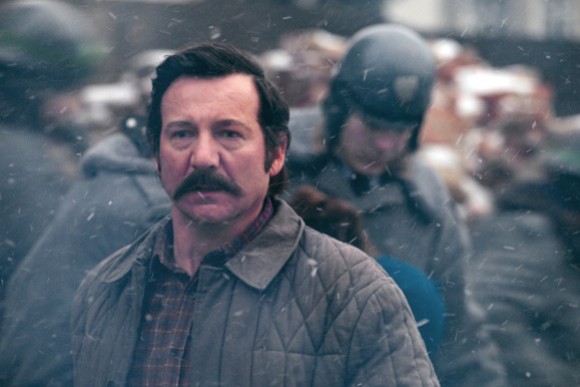Obviously enjoying being in the spotlight again Walesa displayed some of the legendary charisma that made him beloved by millions as a leader of the anti-communist movement in Poland.
Wajda’s biopic of the famous leader tells the story of Walesa’s rise from simple shipyard work worker to world leader with the deft hand of a master filmmaker. The film makes up the third film in what Wajda has described as a trilogy with his two earlier masterpieces about the Solidarity movement, Man of Marble (1977) and Man of Iron, (1981) which charted the rise of the movement and the heroic struggle for freedom.
In Walesa, Man of Hope, the director uses the device of the Italian journalist Oriana Fallaci played by Maria Rosaria Omaggio interviewing Walesa in 1981 just before he was arrested for leading the protests against the regime. The story is told in a series of flash backs as recalled by Walesa as he tells Fallaci about his experiences and how he came to be the leader of the Solidarity movement.
The film manages to show both the private Walesa as a father and husband and the public Walesa who was a natural leader who drew people to him. Both the events as recalled by Walesa and the exchanges between Walesa and Fallaci in his small flat serve to shed light on the complicated personality of the trade union leader.
Wajda seamlessly integrates archive footage of real events like the historic shipyard protests and clashes with masterfully staged action. The film is traditional story-telling in the best sense of the word. Wajda lets the drama of great events and a great man speak for themselves.
Wajda manages to show a man who had the courage to face imprisonment, possible torture and death with a down to earth attitude. Walesa is portrayed as a man who simply saw his duty and accepted it even when it meant great personal danger to himself and the family he loved so much. It defines what makes a man truly heroic. What he really risked is emphasized when he leaves his family each time with his watch and wedding ring to sell as he goes out once again to face danger in the streets as the leader of the protests.
Robert Wieckiewicz as Walesa manages to capture the Walesa with amazing accurracy down to his gestures and his expressions. It was uncanny seeing the real Walesa after Wieckiewicz’s screen portrayal which bore such a close resemblance to the Polish leader. Agnieszka Grochowska as Danuta, Walesa’s worried wife and mother of his seven children had less of a role to work with but managed to bring into focus the key role in history she played when Walesa sends her to Sweden to pick up his Nobel Prize.
Wajda finishes the film when communism is toppled and Walesa is honoured in the American congress as a leader and freedom fighter. Few men have had as much of an impact on 20th century history as Lech Walesa and few people were as close to him and as able to tell his story as Andrzej Wajda who was not only his contemporary but served as a Senator in the Polish parliament while Walesa was president. Wajda said he made the film because he thought that it was important that people remembered Walesa as a figure of hope and so that young people today would be inspired to be involved in politics. As Walesa said when speaking to journalists in Venice: “Maybe it’s time for me to start another revolution.”
Walesa, Man of Hope: Out of Competition (Poland)
Directed by Andrzej Wajda
Cast: Robert Wieckiewicz, Agnieszka Grochowska, Maria Rosaria Omaggio




















